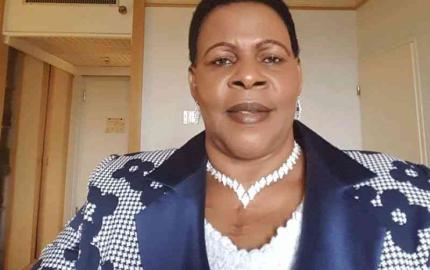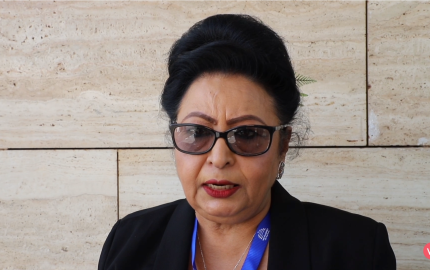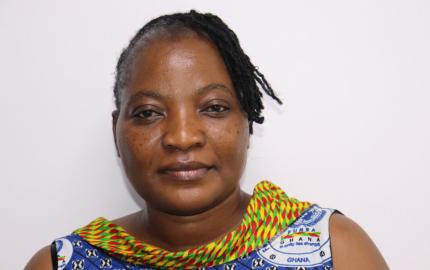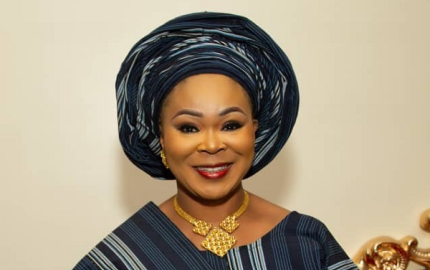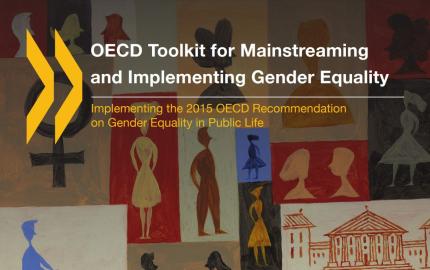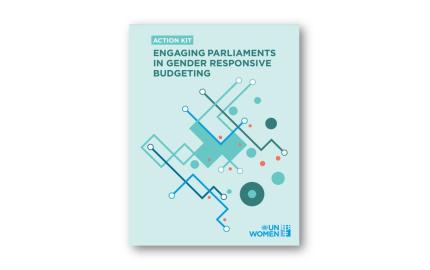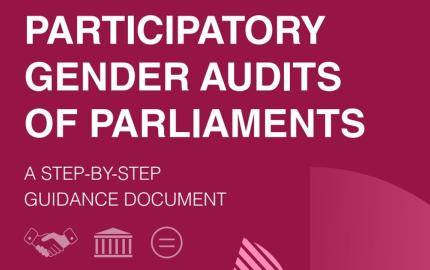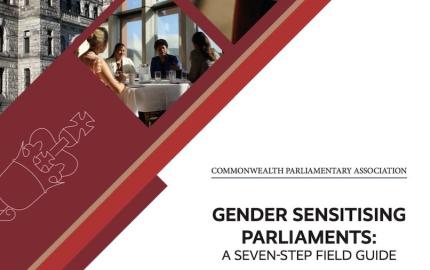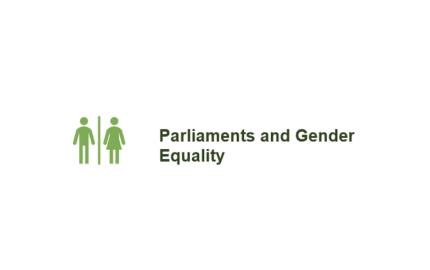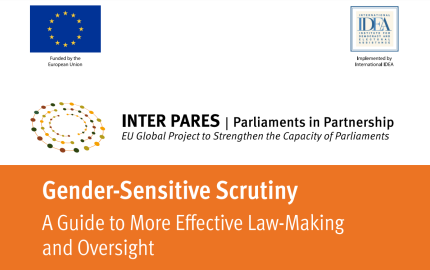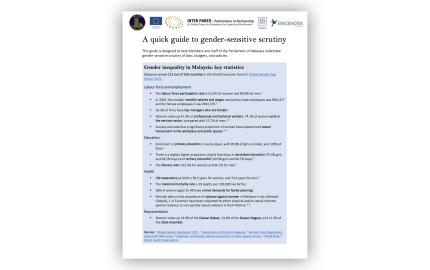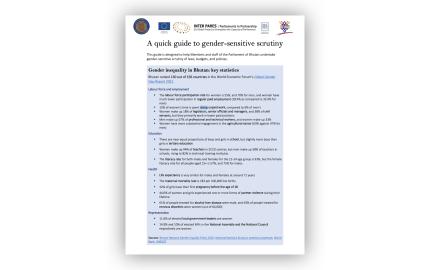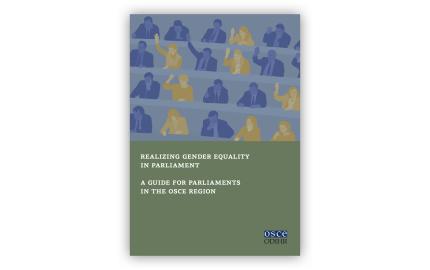Parliaments & Representatives
Main navigation
SENATE President Mabel Chinomona has condemned violence against female legislators saying it erodes trust and confidence that citizens place in their elected representatives.
Chinomona said there was a need to enact and enforce legislation that criminalised and penalised violence against women in politics.
“This legislation should include clear definitions, stringent penalties, and avenues for redress, ensuring a robust and unambiguous deterrent against such malpractices,” Chinomona said.
Click here to read the full article published by NewsDay Zimbabwe on 24 November 2023.
Image by NewsDay Zimbabwe
Justice Minister Helen McEntee has opened up about how it can be a “challenge” to raise two children as a cabinet minister and how she sometimes feels “guilty” when she struggles to find a work-life balance.
Speaking to The Baby Tribe podcast, Ms McEntee discussed life as a mother to two sons and being the first minister to take maternity leave.
She said her view “hasn’t changed” on whether women “can do everything and they should be allowed to do everything”, but she acknowledged that it is hard at times.
Click here to read the full article published by the Irish Independent on 14 November 2023.
Image by Irish Independent
Veena Kumar Bhatnagar is a Fijian politician who served as a member of the Parliament of Fiji from 2014 to 2022. She served as the Assistant Minister for Women, Children and Poverty Alleviation.
Interview conducted by iKNOW Politics during the 145th Inter-Parliamentary Union’s Assembly in Kigali, Rwanda, in October 2022.
A Social Development and Gender Specialist/ Consultant, Dr Miriam Rahinatu Iddrisu, has described as worrying statistics indicating a decline in women’s participation in politics in the country.
She said the statistics did not tally with Ghana’s credentials as a mature and stable democratic country with a well-functioning multi-party system and a strong broadcast media.
Click here to read the full article published by the Graphic Online on 25 October 2023.
Barrister Uju Kennedy-Ohanenye, the Honourable Minister of Women Affairs has lamented the Non-inclusivity of the Nigerian Women in Politics and decision making which has become a barrier to the country’s socio-economic growth.
The Minister who advocated for all hands to be on deck towards breaking those barriers that have impeded our quest for socio-economic advancement as a nation, over the years, appealed that, “We need to break the barrier if we must move forward as a country”.
Click here to read the full article published by Independent Nigeria on 21 October 2023.
The death of U.S. Sen. Diane Feinstein (D-Calif.) calls to mind her election to the upper House in 1992, which is remembered as the Year of the Woman. Why is it called that?
“Morning Edition” host Jennifer Lynn checked in with WHYY’s Dave Davies for a quick history lesson and a look-ahead to another possible Year of the Woman.
Click here to read the full article published by Whyy on 3 October 2023.
The deliberate spread of harmful and false content aimed at women is a current threat to their safety, job performance, mental health, as well as to the institutions they represent, weakening not only women’s active life in the public but also the democratic system.
Our research indicates that there is a need for codes of conduct in various areas of government: considering the multiple elections happening in the Latin America Region, a window of opportunity has been identified to develop and implement mechanisms to safeguard women in Parliament.
The implementation of Codes of Conduct in Parliaments creates a better decision-making process, significantly reducing possible aggressions between peers. In politics the existence of a code of conduct can place the issue of online gender violence on the agenda, making visible and enabling effective action against.
This research focuses on the experience of Latin American countries to outline recommendations for possible actions and best practices to help prevent digital political violence against women in Parliaments. A comprehensive desk review was carried out on countries with existing legislation in the Region reviewing the existence of protocols, legislative work, draft bills and bills, and analyzing current European Codes of Conducts to compare. Understanding and addressing this phenomenon is essential to ensuring gender equality in politics and promoting a violence-free parliamentary environment for all individuals.
In addition, the methodology implemented reveals significant barriers to recognizing political aggressions as a form of violence, despite the prevalent use of the term "violence" in the outcome of the research. This underscores the urgent need for a clear typification of online gender-based violence against women parliamentarians. Additionally, there is notable skepticism regarding the effectiveness of existing codes and regulations in safeguarding women from such violence. Our analysis shows diverse narratives explaining the roots of political violence and discrimination against women in public life. Emphasizing the connection between these findings is imperative to address these gaps through the development of robust codes.
Read here the full report published by Fundación Multitudes on August 2024.
This online resource will guide you in implementing the OECD Recommendation on Gender Equality in Public Life. In addition to better familiarising you with the Principles, the Toolkit lets you compare indicators and good practices in use in numerous countries. The self-assessment tools will help governments assess the strengths and weaknesses of their gender policies, which in turn, will help policy makers set priorities for improvement.
Source: OECD
This action kit is a practical tool for unpacking gender responsive budgeting (GRB) and engaging parliaments and parliamentarians in strengthening scrutiny and oversight of gender responsive budget formulation, execution, and evaluation. As a result of their interventions, the budget process can be more participatory, inclusive, and effective.
This publication is directed primarily to actors who want to build an effective system for integrating GRB into the annual state budget process. This includes Members of Parliament (MPs), parliamentary staff and committees, caucuses of women MPs, as well as other actors, including UN Women or other United Nations entities who may want to initiate and support a stronger role for parliament and MPs in GRB.
The action kit is divided into sections:
- Building government systems to support GRB through the budget cycle;
- Parliament’s role in engaging with GRB in the budget process; and
- Programmatic interventions to support parliaments in the GRB process.
To ensure the guidance and information provided in the publication are grounded in practice, country examples of GRB implementation and entry points for parliamentary engagement are included.
Click here to access the publication.
The OSCE Office for Democratic Institutions and Human Rights (ODIHR) and the OSCE Parliamentary Assembly (OSCE PA) today published a “Participatory Gender Audits of Parliaments, a Step-by-Step Guidance Document,” which offers comprehensive tools and detailed steps on how parliaments can fully capitalize on their potential to implement a gender-sensitive and intersectional approach to legislative processes.
The PA and ODIHR collaborated on the publication, which sets out how to implement participatory gender audits through a clear framework and step-by-step process. The Guide recognizes that each parliament is unique and will undertake the audit in unique circumstances and it allows parliaments to choose the scope of the audit, the format and the timescale within which it will be conducted. As such, it adds to the extensive OSCE acquis in support of all parliaments of the region and it is in line with institutions’ respective mandates to advocate for ensuring transparency and accountability of all parliamentary procedures, practices, and standards, including those aimed at gender mainstreaming and conducting gender audits or assessments.
The “Participatory Gender Audits of Parliaments, a Step-by-Step Guidance Document” complements the “Realizing Gender Equality in Parliament: A Guide for Parliaments in the OSCE Region,” published in December 2021, which brought together lessons learned and good practices from 46 national parliaments in North America, Europe and Central Asia on introducing and improving gender sensitivity in parliaments, on which the two Institutions have also closely co-operated.
Click here to access the report.
The Commonwealth Parliamentary Association’s Gender Sensitising Parliamentary Guidelines: A Seven-Step Field Guide (‘Field Guide’) provides a blueprint for Commonwealth parliaments interested in undertaking a Gender Sensitive Parliament (GSP) review of their institutions with the objective of making their parliaments more representative and inclusive. The Field Guide builds on earlier Commonwealth Parliamentary Association (CPA) and Commonwealth Women Parliamentarian’s (CWP) gender sensitising reports, in which a GSP is defined as a place that responds to the needs and interests of women in its structures, operations, methods, and work and is a workplace that removes barriers to women’s full participation.
GSP reviews have the potential to respond to the needs of parliamentary members and staff who identify as women or as belonging to another marginalised group, and in some Commonwealth contexts, this includes people with intersecting identities, such as Indigenous People, Black People, and People of Colour, Lesbian, Gay, Bisexual, Transgender, Queer+ People (LGBTQ+), and people living with disabilities.
Click here to access the guide.
This course, written by Dr Sonia Palmieri, explores why and how to build gender sensitive parliaments. Rich in case studies, it sketches the international framework for action and outlines opportunities for shaping contextually-appropriate parliamentary processes and norms.
Click here to access the course.
Parliaments have a key role in ensuring not only that everyone is properly represented in decision-making, but also that legislation and government actions take account of the needs and experiences of women and men on an equal basis. However, the achievement of gender equality requires more than commitments and good intentions. It is reliant on action.
This Guide is designed to help parliamentarians, officials, civil society and democracy-support organizations undertake gender-sensitive scrutiny. It provides a model for gender-sensitive scrutiny and demonstrates how the techniques can be used when carrying out pre- and post-legislative scrutiny, conducting oversight and monitoring budgets. It also provides case studies and resources.
Click here to access the guide.
This guide is designed to help Members and staff of the Parliament of Malaysia undertake gender-sensitive scrutiny of laws, budgets, and policies.
Click here to download the guide published by INTER PARES.
This guide is designed to help Members and staff of the Parliament of Bhutan undertake gender-sensitive scrutiny of laws, budgets, and policies.
Click here to download the guide published by INTER PARES.
This practical guide is intended to support the full range of parliamentary actors — from parliamentary leadership teams, members of parliament, and political and parliamentary staff, to parliamentary practitioners and civil society organizations dealing with gender equality issues — in transforming these institutions into gender-sensitive parliaments.
Click here to access the guide.
